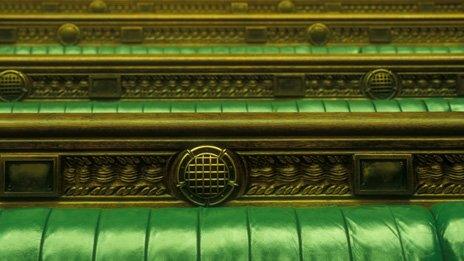Over half of Wales MPs may lose seat in boundary change
- Published

Which Welsh MPs will survive the boundary changes to return to the House of Common's benches?
The proposal to cut the number of parliamentary constituencies in Wales from 40 to 30 could see over half the current MPs lose their seats.
Some are under threat from their constituency disappearing entirely, meaning they may have to compete with neighbouring colleagues for selection.
Others could see changes to their existing seat's boundaries alter the likely political make-up of voters.
MPs from all parties are at risk from the proposals.
The proposal to scrap Cardiff South and Penarth and create Cardiff East, and Cardiff Central and Penarth, means the current Cardiff Central Lib Dem MP Jenny Willott could become vulnerable as the new seat would contain areas where the Lib Dems have less sway.

Jonathan Evans and Wayne David could be rivals for the new Caerphilly and Cardiff North seat
If Cardiff North and Caerphilly merge, Conservative MP Jonathan Evans may be at risk from an expanded Cardiff North taking in a large part of Labour-voting Caerphilly. Equally, the Caerphilly Labour MP Wayne David would have to win in a diluted Labour electorate.
Mr David believes Labour would be disproportionately affected by the changes, and said it wouild be undemocratic as the changes would create "monster constituencies".
In the south Wales valleys, Cynon Valley would go, but the sitting MP Ann Clywd, who is 74, may choose not to contest another election. If so, the Labour Merthyr Tydfil MP Dai Havard could have a clear path to stand for the new seat of Heads of the Valleys.
'Dilute voice'
Further west, the merger of Aberavon with part of Ogmore would put sitting Labour MPs Hywel Francis and Huw Irranca-Davies in direct competition for selection.
Mr Irranca-Davies said the changes may be "arithmatically fair" but would dilute Wales' voice as a nation at UK level, and would affect all political parties in Wales.

Wales Office minister David Jones is facing the disappearance of his seat
Swansea West's Geraint Davies and Gower's Martin Caton, both Labour, face the same possible competition if their seats are amalgamated as proposed.
With the conversion of Preseli Pembrokeshire (Stephen Crabb, Conservative), Carmarthen West and South Pembrokeshire (Simon Hart, Conservative), and Carmarthen East and Dinefwr (Jonathan Edwards, Plaid) into two new seats, South and West Pembrokeshire, and Caerfyrddin, the two Conservatives could face a selection battle for the Pembrokeshire seat, with Mr Hart looking the most vulnerable.
Part of Plaid Cymru-leaning north Pembrokeshire would be subsumed within a revamped Ceredigion, which may pose a problem for incumbent Lib Dem Mark Williams at the ballot box.
His party colleague Roger Williams would see his Brecon and Radnor seat being expanded to contain part of Conservative-held Montgomeryshire and renamed South Powys.
This could affect the present Montgomershire MP, Glyn Davies, as combined with the loss of the southern part of his seat, the northern boundaries of the proposed Glyndwr and North Powys contain large parts of Labour-held Clywd South, which is disappearing and could see the end of the incumbent MP Susan Elan Jones.
Across the rest of north east Wales, the two Labour-held seats of Vale of Clwyd and Delyn would disappear and be partially replaced by a Dee Estuary seat, affecting Chris Ruane and David Hanson.
The current Conservative Wales Office minister, David Jones is also expected to have to seek a new seat such as North Wales Coast, if his existing constituency of Clwyd West is abolished. However, he could face a contest from Aberconwy's Guto Bebb, after his seat is also dissolved.
Plaid Cymru's Hywel Williams is likely to face an election battle with Ynys Mon's Labour MP Albert Owen, whose seat is expanding over to the mainland to incorporate part of Mr Williams' Arfon constituency and being renamed Menai ac Ynys Mon.
Dwyfor Meirionydd would be replaced by an enlarged Gwynedd constituency although this would be unlikely to pose a problem for Plaid Cymru's parliamentary leader Elfyn Llwyd, should he decide to continue to seek selection for Parliament after 2015.
- Published11 January 2012